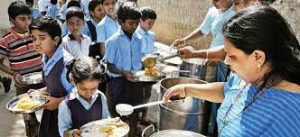Midday Meal Scheme:

A new study on the intergenerational benefits of India’s Midday Meal Scheme was published.
- It found that midday meals leave a long-lasting impact. Children of mid-day meal scheme beneficiaries show better growth.
- The study used the nationally representative data on cohorts of mothers and their children by birth year and socio-economic status spanning 23 years.
- It is a first-of-its-kind inter-generational analysis of the impacts of a mass feeding programme.
Height-to-Age Ratio :
- Girls who had access to the free lunches provided at government schools, had children with a higher height-to-age ratio than those who did not.
Linkage of Midday Meal & Stunting:
- By 2016, the prevalence of stunting was significantly lower in areas where the mid scheme was implemented in 2005.
- The linkages between midday meals and lower stunting in the next generation were stronger in lower socio-economic strata and likely work through women’s education, fertility, and use of health services.
Interruption:
- The interruptions to schooling and to the midday meal scheme could have even longer term impacts, hurting the nutritional health of the next generation as well.
About Midday Meal Scheme:
- The Midday meal scheme (under the Ministry of Education) is a centrally sponsored scheme which was launched in 1995.
- It is the world’s largest school meal programme aimed to attain the goal of universalization of primary education.
- Provides cooked meals to every child within the age group of six to fourteen years studying in classes I to VIII who enrolls and attends the school.
- Objective: Address hunger and malnutrition, increase enrolment and attendance in school, improve socialisation among castes, provide employment at grassroot level especially to women.




